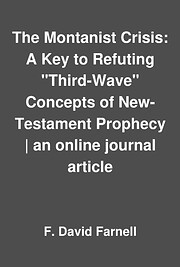

Click on a thumbnail to go to Google Books.
|
Loading... The Montanist Crisis: A Key to Refuting "Third-Wave" Concepts of New-Testament Prophecy | an online journal articleby F. David Farnell
None No current Talk conversations about this book. no reviews | add a review
No library descriptions found. |
Current DiscussionsNonePopular coversNone
 Google Books — Loading... Google Books — Loading...RatingAverage: (4) (4)
Is this you?Become a LibraryThing Author. |
|||||||||||||||||||||||||||||||||||||||||||||||||||||||||||||||||||||||||||||||||||||||||||||||||||||||
The Orthodox Christian perspective does not teach that manifestations of the miraculous charismata of the Holy Spirit ceased after the apostolic era, as some heterodox have taught. Cessationism is an obvious error, as demonstrated by the miraculous signs, wonders, and prophesyings which have been evident in the lives of many of the saints since the Day of Pentecost. The Gifts of God poured out upon the Church are irrevocable though they are only manifest however and whenever God wills together with our human cooperation. Nevertheless, despite the author's cessationist perspective, he rightly calls our attention to the issues at hand when Montanism arose within the Church of the second century. By learning how the early Church dealt with false prophesying in the Church, today's clergy can be prepared to deal with any "prophetic" manifestations which cause confusion, disorder, apathy, irrationality, or disillusionment among the faithful through ecstatic enthusiasm, manipulative greed, or false predictions and disappointing promises attributed to the All-Holy Spirit of Truth as occurred in the "prophecy movement" called Montanism.
As Farnell points out, it is noteworthy that the abuse of prophecy by Montanists led to the gradual discrediting and disappearance of spontaneous prophesying among congregants within the context of the Church's public worship, from the beginning of the third century and onwards. The spontaneous, public manifestation of prophecy, tongues, and interpretation among congregants within the Orthodox Church's liturgical services, as described in FIRST CORINTHIANS 14 and THE SHEPHERD OF HERMAS, no longer occurs at all, so it would seem, save, perhaps, during the homily and only through the one giving the homily, and the gradual disappearance of such spontaneous, public prophesying among laity in the congregation seems to have begun with the Orthodox hierarchical suppression of Montanism's new form of prophesying in the second and third centuries.
How are we to understand such a change in the Church's corporate experience of prophecy? Was it caused by the suppression of the gift of prophecy by Orthodox clergy? Such is possible because the Apostle Paul warns against it in FIRST THESSALONIANS 5:19-21: "Quench not the Spirit. Despise not prophesyings. Prove all things; hold fast that which is good." Another possible cause is related to the strength of the faith among believers spoken of by the Apostle Paul in Romans 12:6: "If your gift is prophesying, then prophesy in proportion to your faith." Likewise Saint Cyril of Jerusalem, in his CATECHETICAL LECTURES (ca. AD 350), wishes that the baptized may even be worthy of the gift of prophecy and he explains this as a possibility "for faith is a large affair." With the cessation of the Roman persecutions of the Church in the early fourth century, the faith and fervor of Christians may have largely grown cold compared with the previous faith and fervor under the fire of persecution. The monastic movement appeared at that time to stir of the fire of spiritual fervor as the Apostle Paul says to Timothy: "Neglect not the gift [charisma] that is in you, which was given you through prophecy, at the laying on of the hands of the presbyterate" (I TIMOTHY 4:14) and "Rekindle the gift [charisma] of God, which is in you by the imposition of my hands, for God has not given us the spirit of fear, but the Spirit of Power, and of Love, and of Self-Discipline" (II TIMOTHY 1:6-7). If we are to find the operation of the gift of prophecy in the Church, it now seems to occur only privately and primarily, or even exclusively through monastics.
Most likely, the cause of the disappearance of spontaneous, public prophesying among Orthodox congregants is an interplay of seven main factors: 1) hierarchical suppression of such displays; 2) the fullness of Spirit-inspired liturgical prayer within the Orthodox services making such manifestations less desirable; 3) the will of God; 4) lack of fervor and faith in prayer, asceticism, and charitable deeds; 5) expectation of such manifestations only in private encounters with clergy or monastics or, perhaps, during a homily; 6) ignorance or sin; and 7) long-standing routine and canonization of the status quo. So has anything been lost in the corporate experience of the Church through this change? It would seem so. The Apostle Paul describes what we have lost: "Let the prophets speak two or three, and let the other evaluate. If any thing be revealed to another who is seated, let the first hold his peace. For you may all prophesy one by one, that all may learn, and all may be comforted. If all prophesy, and there come in one who does not believe, or one unlearned, he is convicted by all, he is judged by all, and in this way the secrets of his heart are exposed. Then, falling down on his face, he will worship God, and report that God is truly among you" (I Cor 14:29-31, 24-25). That kind of prophetic manifestation, described in FIRST CORINTHIANS 14, no longer happens in the Divine Services of the Church, but only in the lives of the saints outside of the liturgical services. So it would seem our experience of the Fullness of the Orthodox Faith is lacking in this regard when compared to the experience of the early Christians. That is not to say that the Orthodox Church Herself is lacking anything, but only that we, sinners of our generation, fall short of experiencing the Fullness of the Faith of the Orthodox Church likely due to reasons listed above. (